Synopsis
Act 1
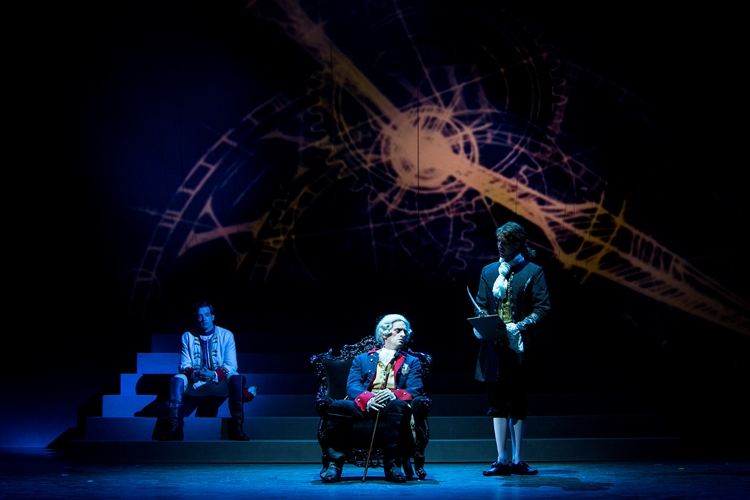 The Prussian king Frederick the Great sees the end of his life approaching. Many years previously he has retired to live in his Schloss Sansscouci; an embittered, aged king. Now he seldom leaves his palace and rarely receives visitors. With death before his eyes, Frederick is engaged in writing his biography and dictates his memories of past days of glory to a secretary.
The Prussian king Frederick the Great sees the end of his life approaching. Many years previously he has retired to live in his Schloss Sansscouci; an embittered, aged king. Now he seldom leaves his palace and rarely receives visitors. With death before his eyes, Frederick is engaged in writing his biography and dictates his memories of past days of glory to a secretary.
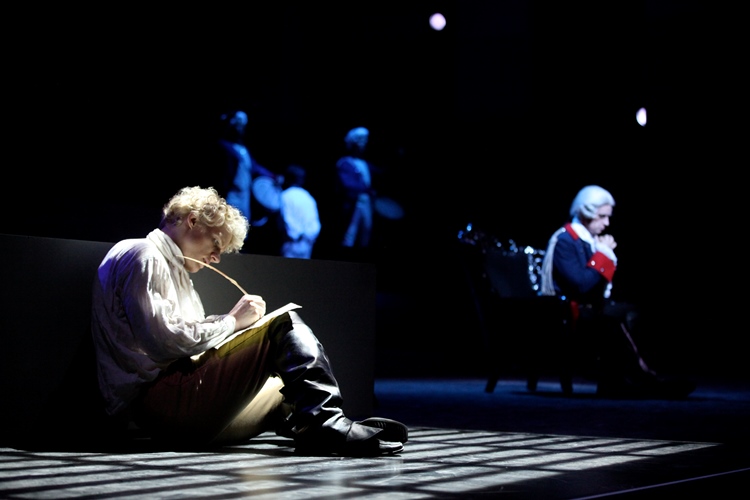 Suddenly he is disturbed whilst dictating. A mysterious figure steps out of the shadows and speaks to Frederick. The king quickly sends the biographer out of the room.
Suddenly he is disturbed whilst dictating. A mysterious figure steps out of the shadows and speaks to Frederick. The king quickly sends the biographer out of the room.
He knows that the person who has just entered the room is not real, but a figure of his imagination who follows him and just cannot shake off. It is Hans von Katte, his best friend, who has been executed 45 years before. Frederick and Katte start a conversation which leads the aging king to remember his youth.
 Frederick, as a young man, is now shown among his family. Frederick William I, Frederick’s father, constantly harasses his son, because he has no understanding of his love for music and literature. Frederick William, known as the “Soldier King”, expects obedience and discipline from his son, the heir to the throne, but Frederick, a sensitive young man, has absolutely no interest in military drill. He and his sister, Wilhelmine, dream of a better future, and there is, indeed, a spark of hope: they are invited to the Dresden court by August the Strong of Saxony and, accompanying their father, they spend several weeks at the court which is known for its extravagant parties.
Frederick, as a young man, is now shown among his family. Frederick William I, Frederick’s father, constantly harasses his son, because he has no understanding of his love for music and literature. Frederick William, known as the “Soldier King”, expects obedience and discipline from his son, the heir to the throne, but Frederick, a sensitive young man, has absolutely no interest in military drill. He and his sister, Wilhelmine, dream of a better future, and there is, indeed, a spark of hope: they are invited to the Dresden court by August the Strong of Saxony and, accompanying their father, they spend several weeks at the court which is known for its extravagant parties.
 A fresh, new life opens up for Frederick during his time at the Saxon court. Here he finds everything he has been longing for: people who appreciate culture and indulge in life. For the first time in Frederick’s life he receives recognition and praise. At court Frederick’s musical talent, education and eloquence are acclaimed. Frederick has a short, but passionate liaison with the young Countess Orzelska, one of August’s mistresses. Frederick and Wilhelmine also deepen their relationship to the Prussian Lieutenant Hans von Katte – the young man who is to follow the king in old age as a hallucination.
A fresh, new life opens up for Frederick during his time at the Saxon court. Here he finds everything he has been longing for: people who appreciate culture and indulge in life. For the first time in Frederick’s life he receives recognition and praise. At court Frederick’s musical talent, education and eloquence are acclaimed. Frederick has a short, but passionate liaison with the young Countess Orzelska, one of August’s mistresses. Frederick and Wilhelmine also deepen their relationship to the Prussian Lieutenant Hans von Katte – the young man who is to follow the king in old age as a hallucination.
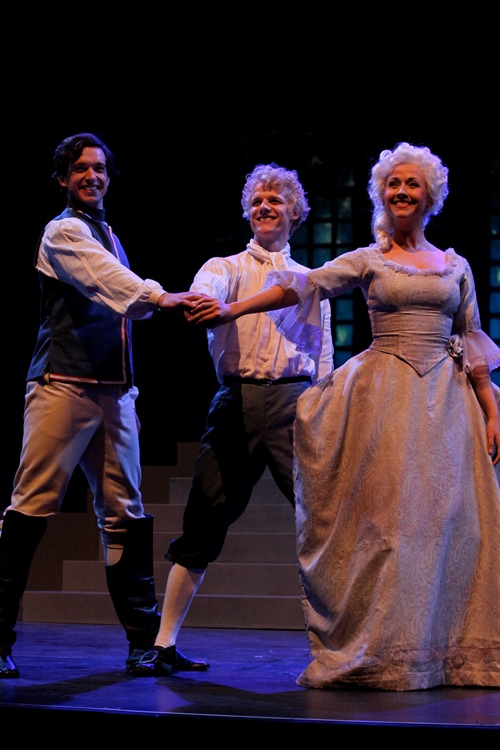 On his return to Berlin Frederick has become a different person. Frederick, his sister and Lieutenant Katte become sworn friends who live out their ideals together. Wilhelmine and Katte develop a love for each other, but Frederick is against this relationship. Now that he has gained self-confidence, Frederick increasingly rebels against his father’s tyranny. This youthful rebelliousness provokes the king so much that the conflict escalates: Frederick William nearly beats his son to death in public. Frederick forms a plan with Katte and decides to flee from Prussia.
On his return to Berlin Frederick has become a different person. Frederick, his sister and Lieutenant Katte become sworn friends who live out their ideals together. Wilhelmine and Katte develop a love for each other, but Frederick is against this relationship. Now that he has gained self-confidence, Frederick increasingly rebels against his father’s tyranny. This youthful rebelliousness provokes the king so much that the conflict escalates: Frederick William nearly beats his son to death in public. Frederick forms a plan with Katte and decides to flee from Prussia.
Act 2
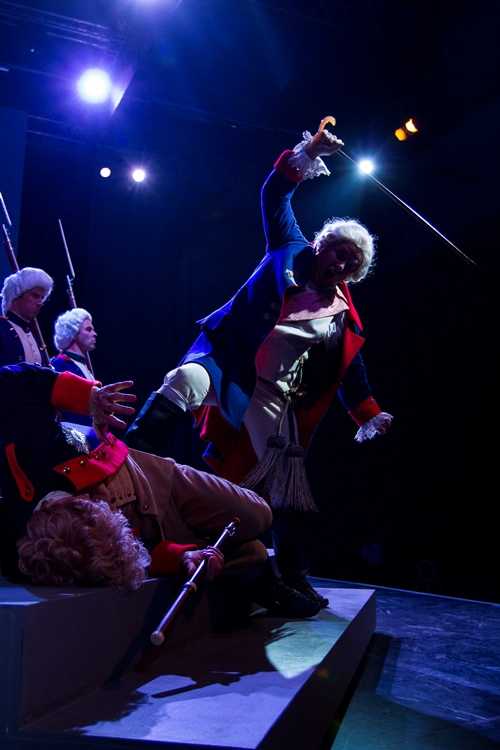 Even as Katte and his beloved Wilhelmine are still arguing about Frederick’s plan to flee, the plan has already been thwarted. Frederick is caught and imprisoned. His father sees the attempt to flee as desertion and high treason and is beside himself with anger. When the corrupt minister, Grumbkow, assists the king in finding out that Frederick’s friend Katte was involved in the plot, the king sees the chance to break his son once and for all. Frederick William has Katte sentenced to death and also gives the order that Frederick is to witness the execution directly from his cell window.
Even as Katte and his beloved Wilhelmine are still arguing about Frederick’s plan to flee, the plan has already been thwarted. Frederick is caught and imprisoned. His father sees the attempt to flee as desertion and high treason and is beside himself with anger. When the corrupt minister, Grumbkow, assists the king in finding out that Frederick’s friend Katte was involved in the plot, the king sees the chance to break his son once and for all. Frederick William has Katte sentenced to death and also gives the order that Frederick is to witness the execution directly from his cell window.
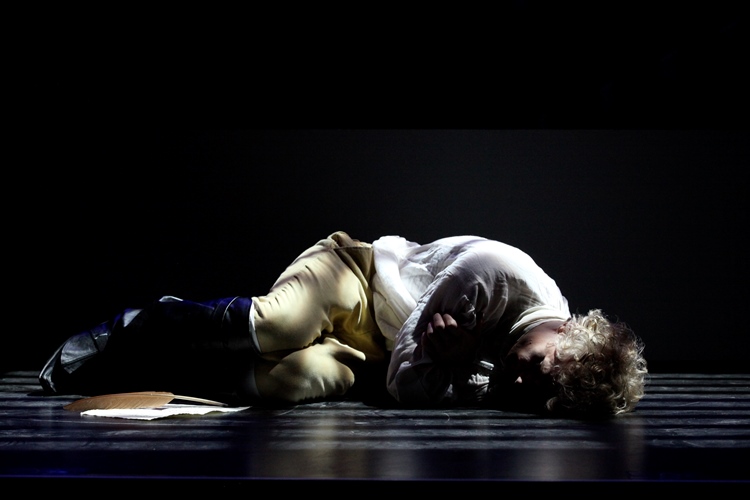 Before the fatal moment comes, the scene is interrupted. The memory of his best friend’s execution is unbearable for the king. It becomes clear that the reason for Frederick’s bitterness lies in this tragedy, and rather than remembering this painful event he continues to enumerate the supposedly glorious moments of his life.
Before the fatal moment comes, the scene is interrupted. The memory of his best friend’s execution is unbearable for the king. It becomes clear that the reason for Frederick’s bitterness lies in this tragedy, and rather than remembering this painful event he continues to enumerate the supposedly glorious moments of his life.
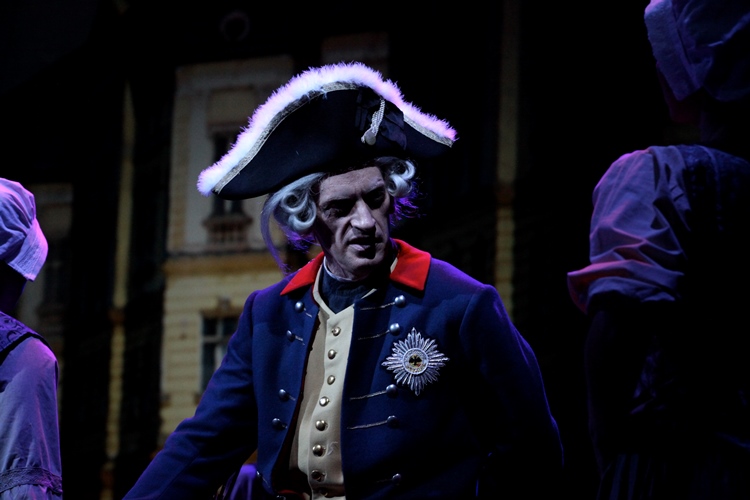 Frederick, therefore, reassumes his story with his enthronement. After the death of his despised father Frederick bears the hopes of the nation, because he seems to stand for progressive ideas, but when, a few weeks later, Maria Theresa is crowned Empress in Vienna Frederick sees his chance to attain a place in history: ironically, the great friend of the arts orders his troops to march on Schlesien which is successfully taken. This victory secures him the sobriquet “the Great”.
Frederick, therefore, reassumes his story with his enthronement. After the death of his despised father Frederick bears the hopes of the nation, because he seems to stand for progressive ideas, but when, a few weeks later, Maria Theresa is crowned Empress in Vienna Frederick sees his chance to attain a place in history: ironically, the great friend of the arts orders his troops to march on Schlesien which is successfully taken. This victory secures him the sobriquet “the Great”.
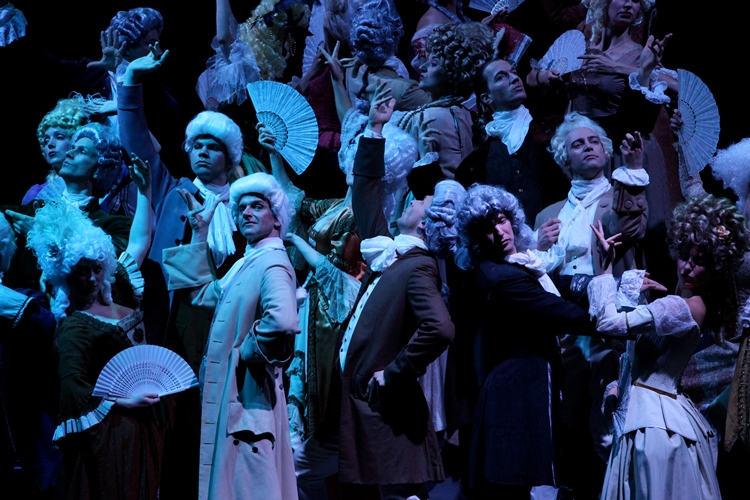 Years later, Frederick has become a highly acclaimed general who can enjoy his repute at his newly built palace, Schloss Sanssouci. He surrounds himself with the greatest artists and writers of his time, among whom there is the famous philosopher Voltaire. Here he believes he has found a place of retreat - “Sanssouci”, a place without cares. His hope to escape from the dark shadows of his past in this way is, however, in vain.
Years later, Frederick has become a highly acclaimed general who can enjoy his repute at his newly built palace, Schloss Sanssouci. He surrounds himself with the greatest artists and writers of his time, among whom there is the famous philosopher Voltaire. Here he believes he has found a place of retreat - “Sanssouci”, a place without cares. His hope to escape from the dark shadows of his past in this way is, however, in vain.
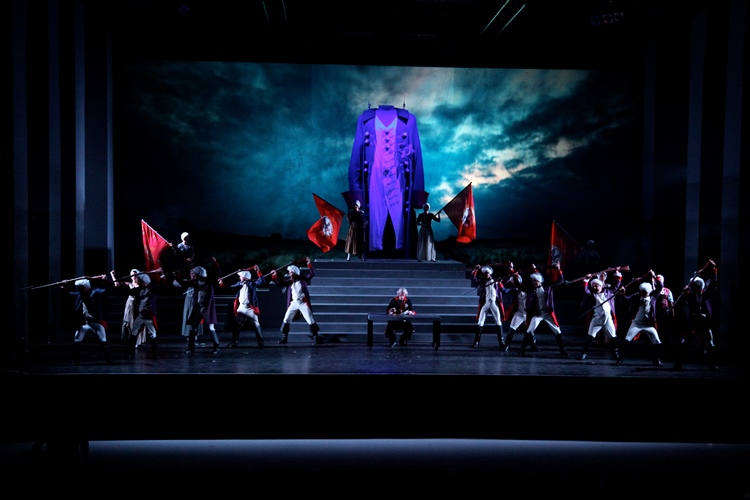 Frederick has changed in the course of time: he has become a vain person who thirsts for renown. When Frederick‘s sister comes to visit him, she gets him to reflect on his behaviour and he reacts angrily, just like his father. The Seven Years’ War which followed was just another instrument for him to numb the pain with violence. But it brings him no relief. The long years of war finally break Frederick who fails to maintain vision of happiness in spite of his apparent success.
Frederick has changed in the course of time: he has become a vain person who thirsts for renown. When Frederick‘s sister comes to visit him, she gets him to reflect on his behaviour and he reacts angrily, just like his father. The Seven Years’ War which followed was just another instrument for him to numb the pain with violence. But it brings him no relief. The long years of war finally break Frederick who fails to maintain vision of happiness in spite of his apparent success.
 When dying, Frederick at last finds the courage to envisage the traumatic picture of his life and confront the unbearable. The great monarch dies accompanied by the hallucinatory figure Katte:
When dying, Frederick at last finds the courage to envisage the traumatic picture of his life and confront the unbearable. The great monarch dies accompanied by the hallucinatory figure Katte:
alone, but freed from pain.

 Suddenly he is disturbed whilst dictating. A mysterious figure steps out of the shadows and speaks to Frederick. The king quickly sends the biographer out of the room.
Suddenly he is disturbed whilst dictating. A mysterious figure steps out of the shadows and speaks to Frederick. The king quickly sends the biographer out of the room. Frederick, as a young man, is now shown among his family. Frederick William I, Frederick’s father, constantly harasses his son, because he has no understanding of his love for music and literature. Frederick William, known as the “Soldier King”, expects obedience and discipline from his son, the heir to the throne, but Frederick, a sensitive young man, has absolutely no interest in military drill. He and his sister, Wilhelmine, dream of a better future, and there is, indeed, a spark of hope: they are invited to the Dresden court by August the Strong of Saxony and, accompanying their father, they spend several weeks at the court which is known for its extravagant parties.
Frederick, as a young man, is now shown among his family. Frederick William I, Frederick’s father, constantly harasses his son, because he has no understanding of his love for music and literature. Frederick William, known as the “Soldier King”, expects obedience and discipline from his son, the heir to the throne, but Frederick, a sensitive young man, has absolutely no interest in military drill. He and his sister, Wilhelmine, dream of a better future, and there is, indeed, a spark of hope: they are invited to the Dresden court by August the Strong of Saxony and, accompanying their father, they spend several weeks at the court which is known for its extravagant parties. A fresh, new life opens up for Frederick during his time at the Saxon court. Here he finds everything he has been longing for: people who appreciate culture and indulge in life. For the first time in Frederick’s life he receives recognition and praise. At court Frederick’s musical talent, education and eloquence are acclaimed. Frederick has a short, but passionate liaison with the young Countess Orzelska, one of August’s mistresses. Frederick and Wilhelmine also deepen their relationship to the Prussian Lieutenant Hans von Katte – the young man who is to follow the king in old age as a hallucination.
A fresh, new life opens up for Frederick during his time at the Saxon court. Here he finds everything he has been longing for: people who appreciate culture and indulge in life. For the first time in Frederick’s life he receives recognition and praise. At court Frederick’s musical talent, education and eloquence are acclaimed. Frederick has a short, but passionate liaison with the young Countess Orzelska, one of August’s mistresses. Frederick and Wilhelmine also deepen their relationship to the Prussian Lieutenant Hans von Katte – the young man who is to follow the king in old age as a hallucination. On his return to Berlin Frederick has become a different person. Frederick, his sister and Lieutenant Katte become sworn friends who live out their ideals together. Wilhelmine and Katte develop a love for each other, but Frederick is against this relationship. Now that he has gained self-confidence, Frederick increasingly rebels against his father’s tyranny. This youthful rebelliousness provokes the king so much that the conflict escalates: Frederick William nearly beats his son to death in public. Frederick forms a plan with Katte and decides to flee from Prussia.
On his return to Berlin Frederick has become a different person. Frederick, his sister and Lieutenant Katte become sworn friends who live out their ideals together. Wilhelmine and Katte develop a love for each other, but Frederick is against this relationship. Now that he has gained self-confidence, Frederick increasingly rebels against his father’s tyranny. This youthful rebelliousness provokes the king so much that the conflict escalates: Frederick William nearly beats his son to death in public. Frederick forms a plan with Katte and decides to flee from Prussia.




 When dying, Frederick at last finds the courage to envisage the traumatic picture of his life and confront the unbearable. The great monarch dies accompanied by the hallucinatory figure Katte:
When dying, Frederick at last finds the courage to envisage the traumatic picture of his life and confront the unbearable. The great monarch dies accompanied by the hallucinatory figure Katte:

